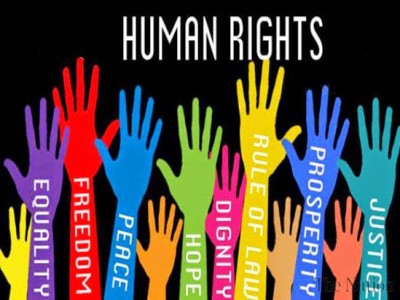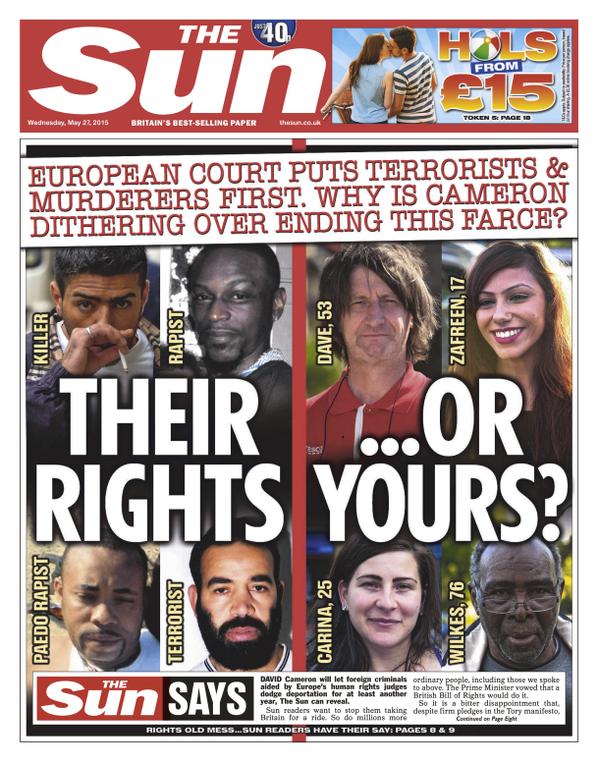Weekly Notes: legal news from ICLR – 29 May 2015
This week’s big news at home was the Queen’s Speech, with its promise of laws to come, while abroad the biggest event was the dawn raid detention of seven Fifa executives on an alleged corruption rap. Plus other legal news and events. Human Rights are Left (for the moment) So will British Bill just… Continue reading
This week’s big news at home was the Queen’s Speech, with its promise of laws to come, while abroad the biggest event was the dawn raid detention of seven Fifa executives on an alleged corruption rap. Plus other legal news and events.
Human Rights are Left (for the moment)
 So will British Bill just Peter out?
So will British Bill just Peter out?
It was all going to be so exciting. The Common Sense Revolution. The Hundred Days of solid gold achievement. Out with the old (HRA), in with the new (BBOR). And then, when it came to the big day… er, oops, sorry everyone! They just couldn’t get their Act (or Bill) together.
The news had broken the evening before. A widely tweeted headline had appeared in The Times saying “Cameron blinks first in human rights row” – though the picture was of the new Lord Chancellor, Michael Gove, who is tasked with the manifesto commitment of “scrapping” the existing Human Rights Act and getting the British Bill of Rights onto the Statute Book instead. This was to have been done within a hundred days of the Tories regaining majority power. Instead, wiser counsels (possibly Gove’s included) have prevailed. The Queen merely announced that her government would “bring forward proposals for a British Bill of Rights”. In other words, it’s not going to happen any time soon, and certainly not within the promised hundred days. Or, as The Telegraph put it:
The totemic Tory demand to axe Labour’s Human Rights Act – as raw a hunk of red meat as most Right wingers could ever hope to be served – had been consigned to the deep freeze.
In the circs, we should all be very patient and understanding and praise them for having the grace to step back and think twice, or perhaps even seven times, about this. (Seven is the number of drafts that those preparing it are supposed to have gone through, so far, in their attempts to produce the new Bill. Which, despite calls from Martin Howe QC and others, has yet to see the light of critical day.)
 It would be utterly cynical, of course, to suggest that the whole idea was nothing more than a sop to the right wing tabloids, to get their support in advance of the election. The Times’s sister paper, The Sun, has made no secret of its virulent hatred of the Human Rights Act, an opinion it saw fit to share on the day of the Queen’s Speech with a dig at “dithering” Cameron and a rhetorical question about “whose rights” they were, “their rights” or “yours” – perhaps forgetting that we’re all human (apart from those of us who are, in one Sun columnist’s view, cockroaches) and perhaps also forgetting that it was valiant Sun journalists who called upon the protection of the Human Rights Act when applying to the Investigative Powers Tribunal over alleged misuse of phone records (against, on this occasion, rather than by, Sun journalists). Irony squared.
It would be utterly cynical, of course, to suggest that the whole idea was nothing more than a sop to the right wing tabloids, to get their support in advance of the election. The Times’s sister paper, The Sun, has made no secret of its virulent hatred of the Human Rights Act, an opinion it saw fit to share on the day of the Queen’s Speech with a dig at “dithering” Cameron and a rhetorical question about “whose rights” they were, “their rights” or “yours” – perhaps forgetting that we’re all human (apart from those of us who are, in one Sun columnist’s view, cockroaches) and perhaps also forgetting that it was valiant Sun journalists who called upon the protection of the Human Rights Act when applying to the Investigative Powers Tribunal over alleged misuse of phone records (against, on this occasion, rather than by, Sun journalists). Irony squared.
If wiser counsels prevailed, it may well have been because of the slenderness of Cameron’s majority, and the number of those on his own benches who would vote against the Bill; but the mobilisation of opinion by, among others, the legal blogging community and commentators in the press cannot be ignored. We’ve already listed quite a few of them in the last few posts here, and here are some more (updated over the weekend):
- Carl Gardner, Head of Legal blog, Why Michael Gove must think carefully about the Human Rights Act (Be careful what you wish for, says Gardner, lest you find our domestic *unelected* judges, divorced from the need to consider Strasbourg jurisprudence, come up with something even more troublesome on their own.)
- British Institute of Human Rights, Human Rights Act and Bill of Rights (also expressing caution)
- Theresa May’s former chief of staff, Nick Timothy, puts the case for total withdrawal, not without recycling a few myths, in the Sunday Telegraph: Scrapping the Human Rights Act must mean escaping Strasbourg too
Snooper’s Charter tops the Bills
There was no shortage of other legislation in the Queen’s Speech, the most controversial being the resurrected Investigatory Powers Bill (formerly Communications Data Bill, but known by its critics as the Snoopers’ Charter) which had been blocked by the Conservatives’ Liberal Democrat coalition partners in the previous Parliament.
Sir Tim Berners-Lee, the inventor of the World Wide Web, is one of those who have spoken out against this Bill. According to City AM he is calling for an Online Bill of Rights, or digital Magna Carta, to protect people’s online privacy and business confidentiality.
However, it seems Theresa May’s determination to enact wide powers to enable the police and security services to monitor private communications is far from unique. Indeed, it seems to be quite the fashion among governments around the world, as Kieron O’Hara notes in the Conversation, Return of the ‘snooper’s charter’ reflects a worldwide move towards greater surveillance
As noted on this blog, France has recently introduced a new law giving much wider powers of surveillance, whose passage through the legislature seems to have been speeded by the shocking Charlie Hebdo killings in January (though it would not have prevented them, since the perpetrators were already “on the radar” and the victims were supposedly under police protection at the time).
O’Hara cites other countries that have introduced similar powers, including Brazil, Canada, and Australia, and concludes:
So the general direction of travel among technologically advanced democracies seems based on the believe that finding the needle in a haystack is made easier by maximising the amount of hay gathered.
I suppose the answer to that is, if it’s in there somewhere, you need to look at the whole haystack to be sure you haven’t missed it. It may not be easier, but it’s got to be done. I think a more important question is, if you do happen to find the needle, what are you going to do with it? (Having perps on the radar didn’t stop either the Charlie Hebdo killings or that of Fusilier Lee Rigby in this country the year before: see Weekly Notes – 16 January 2015.)
See also: ITPro, Snooper’s Charter returns as the Investigatory Powers Bill
Crowdfunding for legal expenses
Is this the answer to the disappearance of legal aid?
Remember the Big Society? This was radical Dave Cameron’s idea of replacing top-down state provision with popular voluntary action. Well, most of that withered in the cold wind of austerity, but perhaps the news that someone has set up a mechanism to enable crowdfunding of proposed litigation is a sign that it has not disappeared altogether.
Litigation funding is already a successful business model, with companies like Harbour Litigation Funding no longer looking for new investors, just new cases to fund. But, writes Joshua Rozenberg in The Guardian, Is crowdfunded litigation the future of justice?, there’s now a new kid on the block, CrowdJustice, which selects public interest cases then invites the public to help fund them. As with many crowdfunding schemes, a project has to reach a “tipping point” of support before it can proceed. But supporters are basically donors, not investors. Their reward is the satisfaction of supporting justice in an age of austerity.
If you’ve got a claim, you can submit this to a crowdfunding process and see if you get enough support to proceed with it. If you want to support a claim, you pledge an amount of money. This means claims need to pass a popular approval test or ethical beauty contest which may skew the choice of what gets through, but there’s no evidential burden or likelihood of success test such as you’d encounter in trying to get legal aid, say, or permission to proceed. That comes later, when the lawyers you’ve paid for are engaged and give their advice.
Read more about it: https://www.crowdjustice.co.uk/
Dates and Deadlines
The Alternative Magna Carta festival
13 June at Free Word, with Keir Starmer QC, Paul Mason, Nick Cohen and other luminaries, presenting “an afternoon of freedoms, literature, Britishness, arts, protest, digital rights and more across three venues in Clerkenwell, London”.
Situations vacant: Director of Bingham Centre for Rule of Law
The Bingham Centre for the Rule of Law is looking for a new director, to replace its founding director, Professor Sir Jeffrey Jowell, who retires this month. Read a job description (PDF)
Law (and injustice) around the world
Iran
Iranian-American journalist on trial for spying
Jason Rezaian, a correspondent for the Washington Post, is being tried in Tehran on vaguely defined charges including espionage and spreading propaganda, after being detained for more than 10 months and only being allowed to meet his lawyer once. Rezaian grew up in California and holds dual American-Iranian citizenship.Full story: The Atlantic
Switzerland
FIFA dawn raids

Seven officials of the Fédération Internationale de Football Association (FIFA) were arrested in dawn raids in Zurich, earlier this week. They were among 14 indicted (by the US Attorney’s Office, Eastern District of New York) on charges of “Racketeering Conspiracy and Corruption”, involving tens of millions of dollars, since 1991. The FBI organised it, and the Swiss carried it out, with ruth-free efficiency, as you’d expect.
Two “anecdotes” come with this story. First, the way the hotel held up spotless and beautifully ironed white sheets to conceal the detainees from the prying paps as they were led out of the building and into waiting police cars. (Look, they seemed to be saying, you can’t see the allegedly guilty parties, but we’ll let you view for yourselves how pristine is our bed linen.) Secondly, it was related how before the raids the hotel concierge sent a message to the affected guests, warning them to let the police enter their rooms, lest the need might arise for their doors to be broken down. Please, no fuss. We’re Swiss. Keep it clean. Keep it quiet. And did I mention about the white sheets?
Prominently absent from those detained was the current and now re-elected (apparently, just) president of FIFA, Sepp Blatter. He is popular with poor countries and unpopular with rich ones. Many people think that he is either complicit in the wrongdoing of his underlings or, if he know nothing about it, incompetent to lead them. (So he’s damned if he did, and damned if he didn’t. That doesn’t seem very fair.) Prince William is among those critical of his presidency (via BBC)Of rather more concern is the consequences of some of the choices of venue for the World Cup which FIFA administers. Qatar, which is due to host the tournament in 2022, has already seen an unacceptably high number of migrant construction worker deaths associated with the building of the stadium and associated infrastructure. When journalists try to investigate the matter, they get arrested: see Weekly Notes 22 May. If the choice of venue was assisted by corrupt payments, these deaths are a far worse fallout than lining a few officials’ pockets with ill-earned cash.
See also. in The Independent,
- International Footballers call on Qatari government and Fifa to stop modern day slavery
- Amnesty International says Qatar still failing migrant workers
Turkey
Religious marriage ruling provokes uproar
According to Yahoo News, who got it from Al Jazeera, Turkey’s Constitutional Court ruled Friday 29 May that it was lawful for citizens to be religiously married without a legally-binding civil marriage, since otherwise they would be indicted for something which a man and woman simply living together would not be. The court said:
“While individuals practically living together and having children without a religious ceremony or wedding are not being punished, punishing people who made choices in terms of their private lives and had religious marriages displays the [regulation’s] intemperance on the issue.
The case appears to arise out of paragraph 5 of the Article 230 of the Turkish Criminal Code, which provides (via Legislation Online) as follows:
(5) The couples who marry by arranging religious ceremony without executing official marriage transactions are sentenced to imprisonment from two months to six months. Both the public action and the punishment imposed thereof, is abated with all its consequences when the civil marriage ceremony is accomplished.
This penalises those who go through a religious ceremony of marriage but fail to acquire a civil registration of their union, whereas there is no regulation in Turkey on couples who live together or have extramarital children, their relationships having no legal status without any rights or penalties.
So it seems the Constitutional Court merely highlighted this apparent inconsistency, and chose to level the playing field. But the ruling is said to have caused uproar among the country’s legal and human rights circles, who argue that the move (perhaps seen as endorsing or equalising the validity in law of a religious ceremony, while evading controls that would apply to a civil registration) would threaten the rights of women and children in the country.
The answer might be to extend the same protection to children, however their parents choose to arrange their affairs, and not to punish those who live together according to the nature of the commitment they enter into, while perhaps according civil rights (such as taxation, inheritance etc) according to the correct civil status.
If underage marriage is the problem, that should be addressed in the same manner as other aspects of child protection, regardless of religion or custom.
United States

Ohio judge makes punishment fit the crime
He also made the criminal fit from the punishment, which required a woman who deliberately avoided paying a taxi fare walk 30 miles to teach her a lesson. According to the Sunday Telegraph, Judge Michael Cicconetti, sitting in the aptly named Painesville Municipal Court, Ohio, apparently has form for deciding on punishments that fit the crime. But these “alternative penalties” are just that – an alternative to going to jail.
According to his court’s website:
Innovative and creative sentencing has brought Judge Cicconetti national and international attention. His sentencing practices have been the subject of articles in national and international news media publications and articles in nearly every major newspaper worldwide, all local and national news programs including the Today Show, Good Morning America, CBS Morning Show, Fox News, Dr. Phil, Paula Zahn and Court TV.
Examples given in the Telegraph include:
- Making a 20-year-old woman who assaulted someone with pepper spray submit to being pepper sprayed back by the victim (instead of 30 days in the slammer).
- Making a teenager who was playing music too loudly sit on his own in the woods in silence.
- Making a man who shouted obscenities at police and called them ‘pigs’, stand with real pigs in the centre of town for two hours.
If Chris Grayling were still in charge of UK crime and punishment, would he consider this appropriate as part of what he was fond of calling his “rehabilitation revolution”?
Image acknowledgements.
- The Human Rights image is from John Bolch’s Family Lore website, but I think originally relates to World Human Rights Day.
- The Sun shining out of its own fundamental human rights came from, er, The Sun.
- The Fifa world cup trophy in chains is actually a piece of merchandise, a keyring (via Rediff.com)
- The lovely flag and gavel are adopted with gratitude from the home page of The Law Offices of Kristina C. Ivtindzioski, LLC, based in Morris Plains, New Jersey.
That’s it for now. (Check for updates in the next day or two.) Enjoy the week ahead, and don’t forget to vote in our 150 Years of Case Law on Trial poll, about to start on its final stretch, 1996 to 2014.
This post was written by Paul Magrath, Head of Product Development and Online Content at ICLR. It does not necessarily represent any views of ICLR as an organisation.